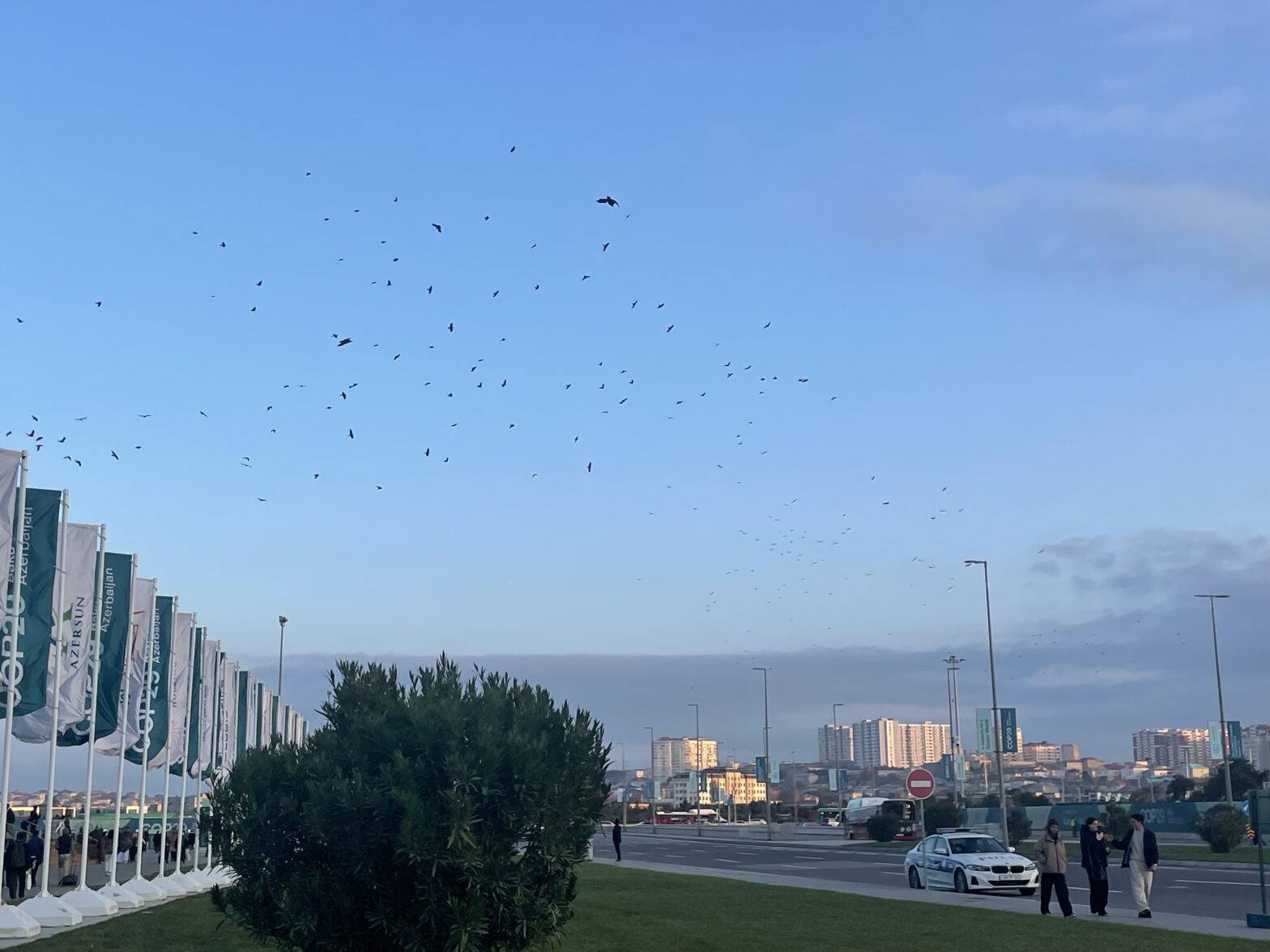By Isabella Childs Michael ’25, Anthropology
On Day 2 of COP29, I walked into the Special Event Room called Buta to attend a panel called “Climate change: an opportunity to strengthen the resilience of transboundary river basins” advertised as being in English. The first speaker introduced the panel, but as the next began, I realized I couldn’t follow—he was speaking French.
I scanned the room for headphones or translation devices but found none. A man working as a climate policy analyst in Germany named Joel, who I had just met, gave me a knowing grin; he hadn’t expected this either. While I strained to extract meaning from my neglected high school French, Joel admitted he could follow about 40%, far more than my 5%. He took notes in French, while I sat, observing. This was a rare occurrence for me at COP29 as a native English speaker; the venue’s events, marketing, and signage were almost completely in English.
Sure, upon reflecting, I unintentionally became more aware of the room’s dynamics: six cameras focused intently on the panel, attendees’ eyes fixed on the speakers—a rarity compared to earlier sessions, where many glanced at their phones. The importance of the discussion was palpable, even if I couldn’t follow its content. Still, I felt disoriented.
I asked Joel if he would share his notes. He not only agreed but also invited me to join him in finding a multilingual event participant to help clarify the notes. On his third try, Joel found someone willing to confirm his translation. Following the generous delegate to their next event, Joel and I learned about the panel’s key points: the river basin’s flow through multiple countries in West Africa, the complications of water rights, and how flooding risks could be mitigated by reshaping rivers to curve naturally, slowing the flow. Joel translated the insights for me in the middle of a busy hallway, with people bustling around us. This was an act of kindness, but I wouldn’t exactly rely on this translation system being recreated in other event rooms.
Being surprised by the language of a panel discussion happened again, this time during the second week of the conference. Another special event called “Addressing agri‐systems adaptation through NbS as a vulnerability and risk reduction measure in the LAC region” was unexpectedly in Spanish. Less phased this time and again with no headsets offered, I pulled out Google Translate to try. It worked—a little bit. As presenters shifted between English and Spanish, I noticed an observer beside me with the same app open, using it to translate English sections to Spanish. In an overwhelmingly English conference, it’s hard to see how using translation apps like Google Translate would be a one-off occurrence for many attendees.
A screenshot from my phone while using Google Translate to translate Spanish to English at the special event “Addressing agri‐systems adaptation through NbS as a vulnerability and risk reduction measure in the LAC region”.
The United Nations maintains six official languages: Arabic, Chinese, English, French, Russian, and Spanish (United Nations). While one might expect translation services to be offered in each of these languages throughout the venue, this was not the case. As an observer, I noticed translation tools were inconsistent. Some rooms offered headsets, but options were limited—often just Spanish or English translations, and even then, the translations were difficult to follow. Imperfect solutions underscored the broader issue: how can COP and the UNFCCC better include non-English-speaking participants? What were two minor moments of disorientation for me as an observer, could mean lives and personal reputations at stake for negotiators advocating for their countries.
At a laundromat near our hotel on a day off from the conference, my classmate Havalin spoke with two delegates from Panama. When asked about their experience as women in negotiation rooms, they emphasized the difficulty of being non-native English speakers from South America. Language errors, they explained, can lead to misperceptions and even a loss of credibility—particularly as women of color navigating these high-stakes spaces.
Language barriers shape how people show up at COP—whether as negotiators, panelists, or observers. It is crucial to understand the obstacles people face in showing up for COP, to know where to expand resources, and work to build a more equitable conference.
References Cited
United Nations. “Official Languages | United Nations,” n.d. https://www.un.org/en/our-work/official-languages.
